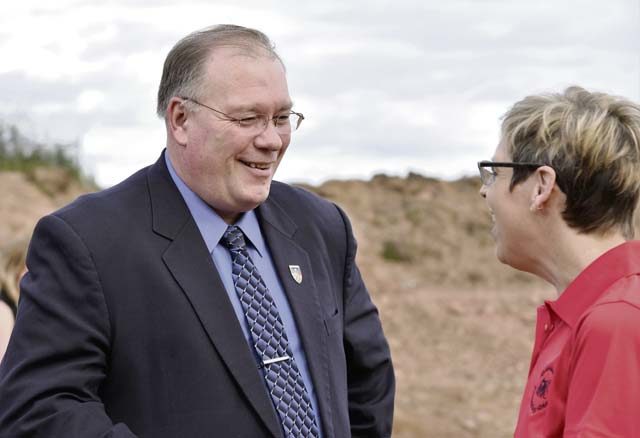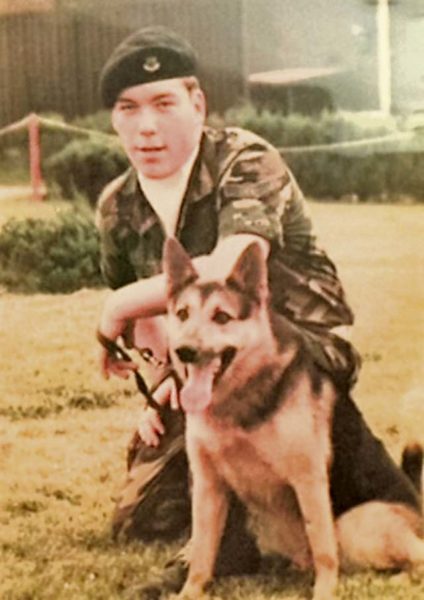
Kevin L. Griess, Ph.D. (Left), the new U.S. Army Garrison Rheinland-Pfalz deputy to the garrison commander, speaks to Penelope A. Miller-Smith, Kaiserslautern Elementary School principal, at the KES ground breaking ceremony Sept. 29 at Vogelweh. — Photo by Mary Ann Davis
When Kevin L. Griess, Ph.D., arrived at U.S. Army Garrison Rheinland-Pfalz last month, he hit the ground running — no fanfare, no fuss — just hard work and drive to get things done. But that’s how the USAG RP’s new deputy to the garrison commander works — drawing upon his 36 years of civil service, relying on his training and throwing in some good old-fashioned farm values and common sense.
Griess came to the garrison from Installation Management Command Headquarters where he served as the IMCOM-Europe liaison officer. He’s also familiar with his current garrison duties since he served as the deputy garrison commander at USAG Schweinfurt (2011-2013) and USAG Ansbach (2013-2015), so relocating back to Germany was like coming home, he said.
“My family was originally immigrated from Edenkoben, Germany, right here in the Rheinland-Pfalz,” he said. “I’m back from where my family initially came from. I am a Rheinland-Pfälzer.”
Being a seventh generation German-American, he still subscribes to very traditional German values of family first, hard work, good laughter and pride in your community. Although he was raised in Sutton, Nebraska — over 4,000 miles away from the Rheinland-Pfalz area — much of his upbringing mirrored the traditional farm values of Germany, he said.

Airman 1st Class Kevin Griess, an Air Force law-enforcement patrolman and K-9 handler, poses with his military working dog, Rex, in 1981. He later retired as a senior noncommissioned officer in 2002 after 21 years of service. Griess became the U.S. Army Garrison Rheinland-Pfalz deputy to the garrison commander last month. — Courtesy Photo
“I grew up in a farm community. Your hard work on a farm is valued. Your character as a person is valued. It’s not your title or what you do, it’s how you do it,” explained Griess, a Nebraska Cornhuskers fan. “Traditional values include taking care of your family. Your job as the head of the household is making sure your children are raised right and learn the same values through hard work. I associate very closely with the German culture and social values because I was basically raised with that same value system and social construct.”
From farm boots to military boots, Griess joined the Air Force at 17 as a law-enforcement patrolman and K-9 handler in 1981, and more than two decades later, he retired as a senior non-commissioned officer in 2002.
“When you join the military, you are a part of something larger than yourself. You subscribe to being able to sacrifice your life and limit your own freedoms in order to serve,” he said. “I was both law enforcement and military police — both are core service.”
From his years of being a K-9 handler, Griess said his best leadership lesson came from his partner — a military working dog named Zeus.
“I learned a lot about trust from him. When you work with a police dog, you go into some high-risk situations — gunfire, attacks — and you have to trust your dog. So what that experience taught me about leadership is I have to trust my employees, my teammates and my Army professionals,” he said. “They work for me and I work for and with them — not through a leash using the Uniform Code of Military Justice or laws, but through trust. Believe it or not, a dog taught me a lot about letting go of my own natural desire to control. So when I became a leader, I learned to trust my subordinates and my leaders.”
Griess had a deep-seated desire to continue serving after 21 years of military service, so he began as a Department of the Army civilian employee working in the antiterrorism office at Camp Humphreys, Korea.
“I didn’t want to stop serving because of a simple piece of [retirement] paper. I still believed in the greater thing, which is our national security. I felt like I could still serve,” he said. “I feel the DGC position is the epitome of service, because my whole job is taking care of our Soldiers so they will be able to fight and so their families can have good quality of life. My job is to do that with the least expenditure of Army funds with maximum benefit and through the trust and respect of our civilian employees who are in federal service. I consider myself to be a professional civil servant.”
To improve himself as a professional civil servant, Griess hit the books and earned several degrees over the years, culminating in a doctorate in organizational leadership from Capella University in 2014. He draws upon his experience, education and training in his role as the USAG RP deputy to the garrison commander, where he said people can expect an “obsessive, dedication to service and community above all else.” That’s what he cares about.
“The last thing warfighters have to worry about are their families while they are away. So spouses, children or whomever remains within my area of responsibility will know I have their back,” he said. “Am I always going to be able to provide service the way they want it? Not always. I’m constrained by the Army budget and many different things. What the community should know is that within these constraints and with all my years of experience and training, that I will do the very best that I can for them every day.”


